
Mayday, Mayday: Books About Activism
“The law in its majestic equality, forbids the rich as well as the poor to sleep under bridges, to beg in the streets, and to steal bread.” —Anatole France
“Those who have put out the people’s eyes, reproach them of their blindness.” —John Milton
The majority of celebratory days in America are devoid of substance, mandating consumption and commercial extravaganzas. For instance, not only have the traditional observances of Abraham Lincoln’s and George Washington’s birthdays been conjoined to one Monday in February, but they are now celebrated as President’s Day—a day in which automobile dealers flourish and department stores and other merchants pound us with that relentless “Buy, buy, buy” leitmotif.
Not to belabor this point, but another dismal development is the virtual indifference to the reasons for the existence of Labor Day. In addition to signaling the official end-of-the-wearing-of-linen season, that day is another signal to loose the dogs of commercialism and the commencement of the fall sales season. Forget about any homage to the Labor Movement and the economic justice that it fought to provide American working people. (In Boston, thousands of students are participating in the major moving-day ritual, which—if they thought about it—has a connection to Labor with a capitol L). And, in fact, in recent years there have been appalling attempts to vilify and devalue the important contributions by labor unions.
And so there is May Day. Originally a Celtic pagan celebration, it is now officially observed as a national holiday in over 80 nations as International Workers’ Day. In the United States, a broad spectrum of the Left (socialist, communist, and anarchist groups) commemorates a seminal event in Labor history, the 1886 Chicago Haymarket Riot or Massacre. What follows is an array of books that represent or inform oppositional thinking and activism. And as I am not inclined to the doctrinaire or the theoretical, you may find these tomes cover a wide disparate topography and are thus listed in no particular order.
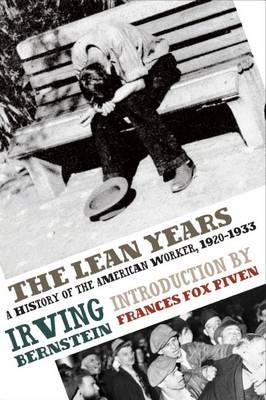
Historian Irving Bernstein’s seminal two-volume history of the American labor movement, The Lean Years: A History of the American Worker, 1920-1933 and The Turbulent Years A History of the American Worker, 1933–1941 (Haymarket Books) “recaptures the social history of the decade leading up to Franklin Delano Roosevelt’s inauguration, uncovers its widespread inequality, and sheds light on the long-forgotten struggles that form the prelude to the great labor victories of the 1930s.”
As Frances Fox Piven observes in her introduction to Volume II, “There are many lessons to be learned from The Turbulent Years, but perhaps the most potent is that the popular moods and understandings that fuel protest movements can change, and change rapidly. We should hope for this in our own time, and we should do more than hope. We should work to make it true.”

Labor unrest and activism is frequently laid at the feet of Karl Marx, the international boogeyman of all right-thinking peoples. Thus, Karl Marx: A Nineteenth-Century Life by historian Jonathan Sperber (Liveright), hailed as “a defining work,” takes a more modern approach to biography by placing Marx in the context of his revolutionary era. Biographer Ian Kershaw extolls Sperber’s approach: “By locating Marx squarely in the society and intellectual currents of the nineteenth century, rather than interpreting him in the light of twentieth-century history, … [this] excellent biography succeeds splendidly in reshaping our image of the man and his thought.”
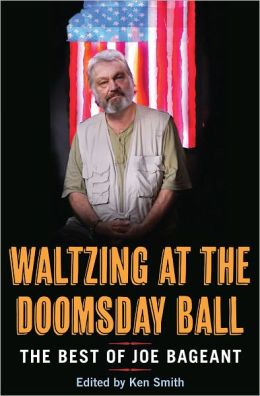
Edited by his close friend Ken Smith, Waltzing at the Doomsday Ball: The Best of Joe Bageant (Scribe Publications) is a compilation of, as the title indicates, some of the most pungent and well-targeted critiques of the regnant social order that you have never read. Since I am fairly certain you have never heard of Joe Bageant (Rainbow Pie: A Redneck Memoir & Deer Hunting with Jesus: Dispatches from America’s Class War), who died in 2011, here is a bit from his mini-autobiography:
Born 1946 in Winchester VA, USA. US Navy, Vietnam era veteran. After stint in Navy became anti-war hippie, ran off to the West Coast … lived in communes, hippie school buses. … Moved to the Coeur d’Alene Indian reservation in Idaho, built a cabin, lived without electricity, farmed with horses for seven years … Moved to Moscow, Idaho, worked on third rate newspaper there …
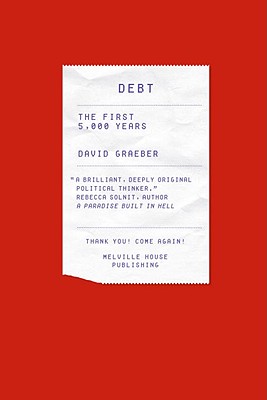
Credited as a patriarch of the Occupy movement, anthropologist David Graeber’s Debt: The First 5,000 Years (Melville House), as one would expect for an anarchist text (apparently his politics also make him non grata at American universities), received minimal mainstream media attention in the US, which did not prevent it from becoming a best seller. Graeber observes at a Washington Post blog:
It is simply assumed, nowadays, that we will be born to indebted, mortgage-paying parents, go deep into debt for our educations, and never, quite, completely, get out—and, therefore, that we will both live our lives with a constant feeling of at least slight attendant fear and humiliation, and that a significant portion of our life income will end up being paid out in interest and financial service payments. …
We already learned in 2008 that debts—even trillions in debts—can be made to go away if the debtor is sufficiently rich and influential. It is only a matter of time before people draw the obvious conclusions: that if money is just a social arrangement, so many IOUs that can be renegotiated by mutual agreement, then if democracy is to mean anything, that has to be true for everyone, not just the few.
And the implications of that could be epochal.
Also, David Graeber’s The Democracy Project: A History, a Crisis, and a Movement (Speigel & Grau), a brief account of the Occupy movement, has been recently published.
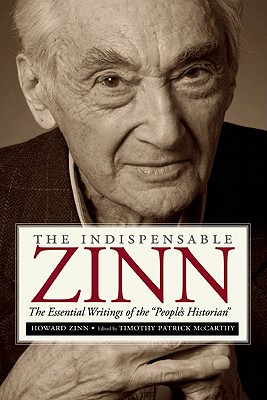
Revisionist historian and progressive activist Howard Zinn’s work, A People’s History of The United States, not only fostered a reexamination of America’s history from the bottom up but spawned a cottage industry of people’s histories. Since Zinn’s death in 2010, there have been numerous posthumous books published. The Indispensable Zinn: The Essential Writings of the “People’s Historian”, edited by Timothy Patrick McCarthy (The New Press) contains excerpts from A People’s; his memoir, You Can’t Be Neutral on a Moving Train; his writings on the civil rights movement; and the full text of his play Marx in Soho. That’s a useful introduction to Zinn with an introduction by fellow activist Noam Chomsky.
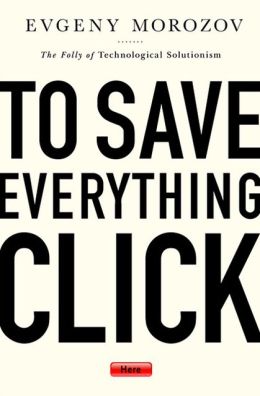
Given the rapidity of the transformational plateaus attached to technological innovation, our attention to the struggle for freedom vs. corporate domination is frequently distracted by the effort to adapt our lives to all manner of digitalized confusion.
Eugene Morozov’s two books, The Net Delusion: The Dark Side of Internet Freedom and the most recent To Save Everything, Click Here: The Folly of Technological Solutionism (Public Affairs), focus on what he views and vociferously attacks as “solutionism”—in technology the idea that deep and serious problems can be solved with a few apps. You can get a taste of Morozov’s take-no-prisoners in the most recent Baffler (#22), one of the few useful oppositional journals being published, along with Truth Dig, TomDispatch and The Onion. Appended to his 16,000-word The Meme Hustler, a dissection of the thoughts of Tim O’Reilly, founder and CEO of O’Reilly Media—to whom he attaches this indictment, “The enduring emptiness of our technology debates has one main cause, and his name is Tim O’Reilly—is an elucidating author’s note:
In researching this essay, I tried to read all of O’Reilly’s published writings … But I decided against interviewing him. First of all, I don’t believe in interviewing spin-doctors: the interviewer learns nothing new while the interviewee gets an extraordinary opportunity to spin the story even before it’s published. Second, my goal in writing this essay was not to profile O’Reilly. Of course, I could have told you all about the wonderful jams—plum, blackberry, raspberry, peach—that he likes to make in his spare time. I left out such trivia on purpose, as my main interest has been O’Reilly the thinker, not O’Reilly the human being. Serious thinkers can be judged by their published output alone.
And if you have an appetite for more Evgeny Morozov, his take on another of his adversaries, futurist Jaron Lanier’s new tome, is here.

Conventional wisdom’s characterization of “the masses” as apathetic lumpen volk is reified by the cynical view that people are inherently selfish and are inclined to “a lifeboat mentality” (see the 1944 film Lifeboat). In A Paradise Built in Hell: The Extraordinary Communities That Arise in Disaster (Viking), author /activist Rebecca Solnit has quite a lot to say about this, mostly in eloquent repudiation of that view. From the book’s description:
The most startling thing about disasters is not merely that so many people rise to the occasion, but that they do so with joy. That joy reveals an ordinarily unmet yearning for community, purposefulness, and meaningful work that disaster often provides. A Paradise Built in Hell is an investigation of the moments of altruism, resourcefulness, and generosity that arise amid disaster’s grief and disruption and considers their implications for everyday life. It points to a new vision of what society could become-one that is less authoritarian and fearful, more collaborative and local.
Solnit selects a half-dozen historic natural disasters from the 1906 San Francisco earthquake to the Hurricane Katrina to illustrate her remarkable view. Read the first chapter here.
The so-called Marathon bombings unleashed another wave of panic, soul-searching, and inscrutable acts of solidarity—the singing of “Sweet Caroline” throughout major league baseballdom, professional athletes wearing various iterations of “Boston Strong,” and now the obligatory music concert engaging various historic septuagenarian bands in a fundraiser. Just as various voices of the Left were at the very least admonished for their “chickens coming home to roost” arguments (Susan Sontag, Howard Zinn), attached to the events of 9/11, it remains to be seen if that view will remain anathema—consider Noam Chomsky’s post Marathon observations:
It’s rare for privileged Westerners to see, graphically, what many others experience daily—for example, in a remote village in Yemen, the same week as the marathon bombings. On April 23, Yemeni activist and journalist Farea Al-Muslimi, who had studied at an American high school, testified before a U.S. Senate committee that right after the marathon bombings, a drone strike in his home village in Yemen killed its target. The strike terrorized the villagers, turning them into enemies of the United States—something that years of jihadi propaganda had failed to accomplish.
Chomsky’s view will be much more creditable, if not acceptable, if and when Americans pays attention to the astounding revelations in journalist Jeremy Scahill’s new book Dirty Wars, described by the publisher as taking us inside America’s new covert wars:
Dirty Wars follows the consequences of the declaration that “the world is a battlefield.” From Afghanistan to Yemen, Somalia and beyond, Scahill reports from the frontlines in this high-stakes investigation and explores the depths of America’s global killing machine. He goes beneath the surface of these covert wars, conducted in the shadows, outside the range of the press, without effective congressional oversight or public debate.
Providing additional verification of the ugly truths revealed by Scahill’s reportage is the film Dirty Wars.
![]()
Three recent anthologies provide a wide array of left-oriented thinkers and activists.
• Protest Nation: Words That Inspired A Century of American Radicalism, edited by Timothy Patrick McCarthy (The New Press) selects from 20th-century speeches, letters, broadsides, essays, and manifestos penned by Eugene V. Debs and Rachel Carson to Harvey Milk and Peter Singer.
• Sasha Lilley compiles Capital and Its Discontents: Conversations with Radical Thinkers in a Time of Tumult (PM Press) that includes Noam Chomsky, Tariq Ali, David Harvey, Ellen Meiksins Wood, Mike Davis, and Doug Henwood.
• UC/Berkeley mentor Harry Kreisler’s Political Awakenings: Conversations with History broadens the scope with hour-long conversations activists such as pre-senatorial Elizabeth Warren, Nobel Peace Prize-winning lawyer Shirin Ebadi, Michael Pollan, Justice Albie Sachs Tariq Ali, Howard Zinn, and Oliver Stone (The New Press).
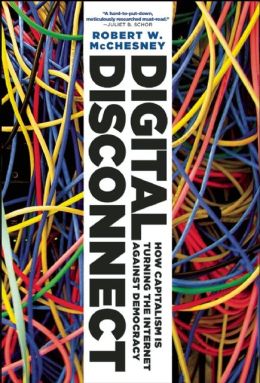
All ballyhoo to the contrary, the notion that the Internet is democratic, spawns democracy, and protects individuals is a thesis that Robert McChesney (Rich Media, Poor Democracy) passionately contests. In Digital Disconnect: How Capitalism is Turning the Internet Against Democracy. Robert McChesney asserts:
“… the sharp decline in the enforcement of antitrust violations, the increase in patents on digital technology and proprietary systems, and massive indirect subsidies and other policies have made the internet a place of numbing commercialism.”
And even more disastrous, the domination of the Internet by corporations has “collapsed credible journalism”:
Journalism is the main way modern societies produce and disseminate political information, and it is of singular importance in democracies. Much has been made of how the Internet has destroyed the commercial news media business model. With no sense of irony, the same people argue that the Internet will combine with free markets to magically re-create a new, different, and superior news media system sometime in the future. I assess and reject those claims.
You can read the first chapter of Digital Disconnect here.Or hear Robert McChesney on Democracy Now.
Last, but not least, George Scialabba’s new collection of essays For the Republic (Pressed Wafer) and Eduardo Galeano’s Children of the Days: A Calendar of Human History (Nation Books) provide more subtle and nuanced points of view of the age-old battle of Freedom vs Organization (aka as domination). Galeano needs no introduction and if you are not familiar with Scialabba—well, you should be.
Needless to say, this grouping of contentious books is neither exhaustive nor exclusive—some have gained notice, and some are known to that growing number of alienated and disenchanted Americans. In any case it is a cause for small wonder that there are still publishers who find that civilization benefits from contrarian (dialectical) views. I am told that on the Freud Memorial in Vienna you can find the epigram, “The voice of Reason is small but persistent.”
Amen for that.
RIP Aaron Swartz.
——
About the author: Robert Birnbaum’s Social Security number ends in 2247. He lives in zip code 02465 and area code 617. He was born in the 2nd month of a year in the 20th century. He doesn’t social network (used as a verb) except through his Cuban retriever Beny (named after Beny More, the Frank Sinatra of Cuba). Izzy Birnbaum also has cloud storage and uses electronic mail. He hopes his son Cuba is the second coming of Pudge Rodriguez. He mutters to himself at Our Man In Boston.
